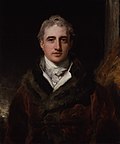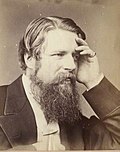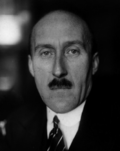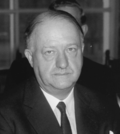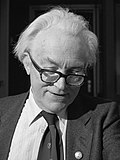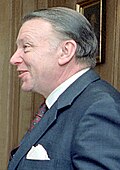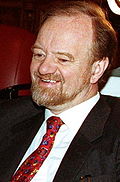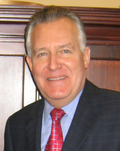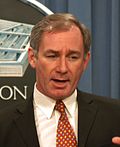LeaderConstituency Term of office Other ministerial offices held as Leader Party Ministry Robert Walpole MP for King's Lynn 4 April 6 February Whig Walpole–Townshend Walpole Samuel Sandys MP for Worcester 12 February 27 August Carteret Henry Pelham MP for Sussex 27 August 6 March Broad Bottom(I & II) Thomas Robinson MP for Christchurch 23 March October Newcastle I Henry Fox MP for Windsor 14 November 13 November William Pitt 'the Elder'MP for Okehampton 4 December 6 April Pitt–Devonshire Vacant April June 1757 Caretaker William Pitt 'the Elder'MP for Bath 27 June 6 October Whig Pitt–Newcastle George Grenville MP for Buckingham October May Henry Fox MP for Dunwich May April Bute ( Tory –Whig ) George Grenville MP for Buckingham 16 April 13 July Grenville Henry Seymour Conway MP for Thetford July 20 October Rockingham I Chatham ( Whig –Tory ) Frederick NorthLord North MP for Banbury October 22 March Tory Grafton ( Whig –Tory ) North Charles James Fox MP for Westminster 27 March July Whig Rockingham II Thomas Townshend MP for Whitchurch 10 July 6 March Shelburne ( Whig –Tory ) Charles James Fox MP for Westminster 2 April 19 December Fox–North Frederick NorthLord North MP for Banbury Tory William Pitt 'the Younger'MP for Appleby until 1784 MP for Cambridge University from 1784 19 December 14 March Pitt I Henry Addington MP for Devizes 17 March 10 May Addington William Pitt 'the Younger'MP for Cambridge University 10 May 23 January Pitt II Charles James Fox MP for Westminster February 13 September Whig All the Talents Charles GreyViscount Howick MP for Northumberland September 31 March Spencer Perceval MP for Northampton April 11 May † Tory Portland II Perceval Robert StewartViscount Castlereagh MP for Down until 1821 Orford from 1821 The Marquess of Londonderry from 1821 June 12 August Liverpool George Canning MP for Liverpool until 1823 Harwich 1823–1826 Newport 1826–1827 Seaford from 1827 16 September 8 August Canning ( Canningite –Whig ) William Huskisson MP for Liverpool 3 September 21 January Goderich ( Canningite –Whig ) Robert Peel MP for Oxford University until 1829 Westbury from 1829 26 January 16 November Wellington–Peel John SpencerViscount Althorp MP for Northamptonshire until 1832 South Northamptonshire from 1832 22 November 14 November Whig Grey Melbourne I Vacant 14 November 10 December Wellington Caretaker Robert Peel MP for Tamworth 10 December 8 April Conservative Peel I Lord John Russell MP for Stroud 18 April 30 August Whig Melbourne II Robert Peel MP for Tamworth 30 August 29 June Conservative Peel II Lord John Russell MP for City of London 30 June 21 February Whig Russell I Benjamin Disraeli MP for Buckinghamshire 27 February 17 December Conservative Who? Who? Lord John Russell MP for City of London 28 December 30 January Whig Aberdeen ( Peelite –Whig ) Henry John TempleThe Viscount Palmerston MP for Tiverton 6 February 19 February Palmerston I Benjamin Disraeli MP for Buckinghamshire 26 February 11 June Conservative Derby–Disraeli II Henry John TempleThe Viscount Palmerston MP for Tiverton 12 June 18 October Liberal Palmerston II William Ewart Gladstone MP for South Lancashire October 26 June Russell II Benjamin Disraeli MP for Buckinghamshire 6 July 1 December Conservative Derby–Disraeli III William Ewart Gladstone MP for Greenwich 3 December 17 February Liberal Gladstone I Benjamin Disraeli MP for Buckinghamshire 20 February 21 August Conservative Disraeli II Stafford Northcote MP for Devonshire North 21 August 21 April William Ewart Gladstone MP for Midlothian 23 April 9 June Liberal Gladstone II Michael Hicks-Beach MP for Bristol West 24 June 28 January Conservative Salisbury I William Ewart Gladstone MP for Midlothian 1 February 2 July Liberal Gladstone III Lord Randolph Churchill MP for Paddington South 3 August 14 January Conservative Salisbury II W. H. Smith MP for Strand 17 January October Arthur Balfour MP for Manchester East October 11 August William Ewart Gladstone MP for Midlothian 15 August 2 March Liberal Gladstone IV William Harcourt MP for Derby 2 March 21 June Rosebery Arthur Balfour [ 7] MP for Manchester East 29 June 4 December Conservative Salisbury(III & IV) ( Con. –Lib.U. ) Balfour ( Con. –Lib.U. ) Henry Campbell-Bannerman [ 7] MP for Stirling Burghs 5 December 5 April Liberal Campbell-Bannerman H. H. Asquith [ 7] MP for East Fife 5 April 5 December Asquith(I–III) Asquith Coalition ( Lib. –Con. –Lab. ) Bonar Law [ 7] MP for Bootle until 1918 Glasgow Central from 1918 10 December 23 March Conservative Lloyd George(I & II) ( Lib. –Con. –Lab. ) Austen Chamberlain [ 7] MP for Birmingham West 23 March 19 October Bonar Law [ 7] MP for Glasgow Central 23 October 20 May Law Stanley Baldwin [ 7] MP for Bewdley 22 May 22 January Baldwin I Ramsay MacDonald [ 7] MP for Aberavon 22 January 3 November Labour MacDonald I Stanley Baldwin [ 7] MP for Bewdley 4 November 4 June Conservative Baldwin II Ramsay MacDonald [ 7] MP for Seaham 5 June 7 June Labour MacDonald II National Labour National I ( N.Lab. –Con. –Lib.N. Lib. ) National II ( N.Lab. –Con. –Lib.N. Lib. until 1932 ) Stanley Baldwin [ 7] MP for Bewdley 7 June 28 May Conservative National III ( Con. –N.Lab. –Lib.N. ) Neville Chamberlain [ 7] MP for Birmingham Edgbaston 28 May 10 May National IV ( Con. –N.Lab. –Lib.N. ) Chamberlain War ( Con. –N.Lab. –Lib.N. ) Winston Churchill [ 7] MP for Epping 10 May 19 February Churchill War (All parties ) Stafford Cripps [ 7] MP for Bristol East 19 February 22 November Independent Anthony Eden [ 7] MP for Warwick and Leamington 22 November 26 July Conservative Churchill Caretaker ( Con. –N.Lib. ) Herbert Morrison [ 7] MP for Lewisham East until 1950 MP for Lewisham South from 1950 27 July 9 March Labour Attlee(I & II) James Chuter Ede [ 7] MP for South Shields 9 March 26 October Harry Crookshank [ 7] MP for Gainsborough 28 October 20 December Conservative Churchill III Eden R. A. Butler [ 7] MP for Saffron Walden 20 December 9 October Macmillan(I & II) Iain Macleod [ 7] MP for Enfield West 9 October 20 October Selwyn Lloyd [ 7] MP for Wirral 20 October 16 October Douglas-Home Herbert Bowden [ 7] MP for Leicester South West 16 October 11 August Labour Wilson(I & II) Richard Crossman [ 7] MP for Coventry East 11 August 18 October Fred Peart [ 7] MP for Workington 18 October 19 June William Whitelaw [ 7] MP for Penrith and The Border 20 June 7 April Conservative Heath Robert Carr [ 7] MP for Mitcham 7 April 5 November Jim Prior [ 7] MP for Lowestoft 5 November 4 March Edward Short [ 7] MP for Newcastle upon Tyne Central 5 March 8 April Labour Wilson(III & IV) Michael Foot [ 7] MP for Ebbw Vale 8 April 4 May Callaghan Norman St John-Stevas [ 7] MP for Chelmsford 5 May 5 January Conservative Thatcher I Francis Pym [ 7] MP for Cambridgeshire 5 January 5 April John Biffen [ 7] MP for Oswestry until 1983 MP for Shropshire North from 1983 5 April 13 June Thatcher II John Wakeham [ 7] MP for South Colchester and Maldon 13 June 24 July Thatcher III Geoffrey Howe [ 7] MP for East Surrey 24 July 2 November John MacGregor [ 7] MP for South Norfolk 2 November 10 April Major I Tony Newton [ 8] MP for Braintree 10 April 2 May Major II Ann Taylor [ 9] MP for Dewsbury 2 May 27 July Labour Blair I Margaret Beckett [ 10] MP for Derby South 27 July 8 June Robin Cook [ 11] MP for Livingston 8 June 17 March Blair II John Reid [ 12] MP for Hamilton North and Bellshill 4 April 13 June Peter Hain [ 13] MP for Neath 11 June 6 May Geoff Hoon [ 14] MP for Ashfield 6 May 5 May Blair III Jack Straw [ 15] MP for Blackburn 5 May 27 June Harriet Harman [ 16] MP for Camberwell and Peckham 28 June 11 May Brown George Young [ 17] MP for North West Hampshire 12 May 3 September Conservative Cameron–Clegg ( Con. –L.D. ) Andrew Lansley [ 18] MP for South Cambridgeshire 4 September 14 July William Hague [ 19] MP for Richmond (Yorks) 14 July 8 May Chris Grayling [ 20] MP for Epsom and Ewell 9 May 14 July Cameron II David Lidington [ 21] MP for Aylesbury 14 July 11 June May I Andrea Leadsom [ 22] MP for South Northamptonshire 11 June 22 May May II Mel Stride [ 23] MP for Central Devon 23 May 24 July Jacob Rees-Mogg [ 24] MP for North East Somerset 24 July 8 February Johnson I Johnson II Mark Spencer [ 25] MP for Sherwood 8 February 6 September Penny Mordaunt [ 26] MP for Portsmouth North 6 September 5 July Truss Sunak Lucy Powell MP for Manchester Central 5 July 5 September Labour Starmer Alan Campbell MP for Tynemouth 5 September Incumbent 

















